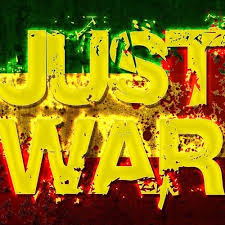Have you ever heard someone say, “It’s not personal; it’s just business”? This statement is usually said in the context of one person destroying the livelihood of another person through a hostile corporate takeover, or pushing a company out of business, or some sort of other action which ruins that other person’s company or income stream.
Of course, the person who is losing their livelihood, income, or business nearly always takes this attack personally. It is impossible not to. Each person is intimately connected with what they do and how they earn their income and provide for themselves and their family. It is deeply “personal” when someone else tries to take that away.
Which brings me to the concept of “Just War.” Just War theory is the idea that some wars are good, right, holy, and just. When such wars are waged, the attacking army often views their actions as good and godly, so that many of those on the receiving end of these attacks should be pleased and happy about the bombs falling out of the sky and the bullets whizzing by their heads because they are being set free and liberated from some form of evil that had enslaved them.
In other words, some proponents of “Just War theory” give the impression that as our armies march off to kill others in God’s name, we can be saying, “It’s not personal; it’s Just War,” and they expect people to say “Thank you!” as bombs fall on their heads.
Yes, this is a caricature of the Just War position, but when you listen to advocates of Just War theory, this caricature is not too far off the mark. They see themselves as liberators and freedom fighters who use war to set others free.
 Let us look briefly at Just War theory, and how it is defined. Following this, I will suggest an alternative method to accomplishing God’s will in this world.
Let us look briefly at Just War theory, and how it is defined. Following this, I will suggest an alternative method to accomplishing God’s will in this world.
Rules of Just War
The rules for Just War were first developed by Thomas Aquinas (c1225-74) and Francisco de Vitoria (c1483-1546) and are still referred to by Christians today. They are as follows:
-it must be fought by a legal recognized authority, eg, a government
-the cause of the war must be just
-the war must be fought with the intention to establish good or correct evil
-there must be a reasonable chance of success
-the war must be the last resort (after all diplomatic negotiations have been tried and failed)
-only sufficient force must be used and civilians must not be involved
Stated differently:
- A just war can only be waged as a last resort. All non-violent options must be exhausted before the use of force can be justified.
- A war is just only if it is waged by a legitimate authority. Even just causes cannot be served by actions taken by individuals or groups who do not constitute an authority sanctioned by whatever the society and outsiders to the society deem legitimate.
- A just war can only be fought to redress a wrong suffered. For example, self-defense against an armed attack is always considered to be a just cause (although the justice of the cause is not sufficient–see point #4). Further, a just war can only be fought with “right” intentions: the only permissible objective of a just war is to redress the injury.
- A war can only be just if it is fought with a reasonable chance of success. Deaths and injury incurred in a hopeless cause are not morally justifiable.
- The ultimate goal of a just war is to re-establish peace. More specifically, the peace established after the war must be preferable to the peace that would have prevailed if the war had not been fought.
- The violence used in the war must be proportional to the injury suffered. States are prohibited from using force not necessary to attain the limited objective of addressing the injury suffered.
- The weapons used in war must discriminate between combatants and non-combatants. Civilians are never permissible targets of war, and every effort must be taken to avoid killing civilians. The deaths of civilians are justified only if they are unavoidable victims of a deliberate attack on a military target.
The Primary Problem with Just War Theory
Just War theory initially seems like a good approach. After all, how else are we to stop evil and violence in this world?
But the truth is that when you talk to any group or government that is engaging in war, they ALL think that their cause is just and that their actions will right a wrong. I challenge you to find a war in human history where one of the sides in the war thought that their involvement in that war was evil and wrong, or that their cause was unjust.
When people and nations march off to war, everybody thinks their cause is righteous, that they are defending themselves against evil and tyranny, and that God is on their side. Go ask Muslim Jihadist, and he will tell you that the violence they engage in against others is holy, right, and just. Jihad, after all, is “Holy War.” Just War, Holy War, Jihad, they’re all the same thing. I wrote about this here: All War is Holy War.
The truth is that all wars are “Just Wars” … or none of them are.
And since we know that most wars are not “Just Wars,” this means that no war is a Just War. We just deceive ourselves into thinking that our war is just while “their” war is evil.
The only real difference between a “Just War” and an evil war is that the people who engage in “Just War” have come up with some excuses to justify their actions in the war. And since every group and government justifies their own, this means that every war is a “Just War” from that group’s perspective.
To put it another way, we could say that “A Just War is a war I engage in, while an evil war is one you engage in. All my wars are just, while all your wars are evil.” But of course, our opponents in war think the same thing. They think their actions are just while ours are evil.
So you see? There is no such thing as a Just War; there are just wars that we justify in our own minds.
So …. Pacifism is the Answer?
No. Pacifism is not the answer either.
Both Pacifism and Just War are inherently self-defeating and impossible to practice.
 There is no such thing as a true pacifist. Pacifists want to do no harm, to engage in no violence, to kill nothing and hurt nothing. Many pacifists are vegetarians, or even vegans, because they do not want to participate in the killing of animals. And yet few pacifists have difficulty with taking antibiotic medicine or spraying their counter with Lysol to ward off germs and bacteria. But germs and bacteria are living microorganisms. So it is okay to kill them, but not larger organisms? At what point does killing become wrong?
There is no such thing as a true pacifist. Pacifists want to do no harm, to engage in no violence, to kill nothing and hurt nothing. Many pacifists are vegetarians, or even vegans, because they do not want to participate in the killing of animals. And yet few pacifists have difficulty with taking antibiotic medicine or spraying their counter with Lysol to ward off germs and bacteria. But germs and bacteria are living microorganisms. So it is okay to kill them, but not larger organisms? At what point does killing become wrong?
How about bugs and insects? Almost all pacifists drive cars. When you drive a car, you will kill insects every single time. Your tires will run over ants and beetles, bees and butterflies will be crushed against your windshield. I once spent a few hours in the woods with a pacifist, and he was swatting mosquitos right along with the rest of us.
People say that Jesus was a pacifist, but it appears to me from Scripture that He ate lamb at the Passover, and fish on the shore of Galilee. People point out that the text doesn’t actually say he ate meat. Fine. But He certainly caught it, killed it, cooked it, and served it. Several times in the Gospels, for example, He gives His disciples a miraculous catch of fish. So many, the boat threatened to sink. And He knew that these fish would be killed and eaten. And in John 21:9, after one of these miraculous catches, when the disciples reach shore, Jesus already has a fire going with fish cooking on the fire.
The point is that true and complete pacifism is inherently impossible to perfectly practice in this world.
So how do we stop evil?
In order to discover how best to respond to evil, let us look at the foundational motivation of both Just War Theory and Pacifism.
Proponents of Just War theory believe that we must stand up for what is right. We must stand up against evil. They are absolutely correct in this belief.
Proponents of Pacifism believe that violence is wrong; especially the violence that takes human life. They are absolutely correct in this belief.
But if we hold to Just War, then (as we have seen), there is no end to violence. Violence always and only begets more violence. Everybody thinks their war is just, and so a “Just War” only leads to a retaliatory “Just War.” There is no end to this cycle.
Similarly, if we hold to Pacifism, then we will often let evil win because we fail to properly stand up to violence and evil, thereby allowing ourselves or others to get steamrolled by violence. People who are pacifists sometimes no nothing but sit there (or shout at) evil while it is occurring, when they should be taking an active stand against it.

The Third Way
Thankfully, Just War and Pacifism are not the only two options. There is a third way, which is the way of Jesus, Martin Luther King Jr., Ghandi, and numerous others.
This third way approach to evil and violence takes the strengths of both Just War and Pacifism while avoiding the weaknesses and drawbacks. This “Third Way” is called Non-Violent Resistance.
It stands up to evil wherever it is found, but with a commitment to doing so non-violently.
The difficulty with this approach is that since we live in a world that is bathed in violence, we have trouble seeing how a non-violent approach can stop the flood of violence. It is difficult to imagine how non-violent resistance can be effective in stopping the spread of evil and violence.
How, for example, would non-violent resistance have stopped Hitler? The truth is that I do not know. (Although part of the answer involves never waging World War I. Hitler was a product of Germany’s loss in World War I. So if World War I had never happened, then World War II would not have happened either. And when you look at the events which started World War I, it was a war that never should have been waged.)
The greatest difficulty with non-violent resistance, however, is that there are no formulas to follow or steps to carry out. The rules to violence are easy: If you are going to engage in violence, make sure your weapons and army are bigger than those of your enemy. There are no such rules with non-violent resistance. Each situation is unique, and requires a unique response.
Responding to Hitler non-violently requires a whole different set of actions than responding to a man on the street who wants to rob you and gunpoint.
Nevertheless, there are six principles I would like to suggest for all non-violent resistance.
The Six Principles of Non-Violent Resistance
 The six principles of non-violent resistance form an acrostic which spells CHRIST. Jesus Christ was the perfect example of how to respond non-violently to evil, and so it is appropriate that His title, Christ, helps guide us into our own way of non-violence.
The six principles of non-violent resistance form an acrostic which spells CHRIST. Jesus Christ was the perfect example of how to respond non-violently to evil, and so it is appropriate that His title, Christ, helps guide us into our own way of non-violence.
Here are the six principles. Non-Violent resistance requires:
- Creativity (bathed in prayer) in the face of evil.
- Honesty about yourself, and how you contributed to the problem.
- Realism about the world situation and the reality of evil. Violence will often “win.”
- Incarnation of the love, patience, and forgiveness of God as seen in Jesus.
- Strength and courage to stand while not retaliating.
- Trust in God to work, and to recognize that sometimes it is better to die than kill.
Note that as we carry out these principles in our live, we are not seeking revolution, but revelation. The key to non-violent resistance is to reveal the character and nature of God as revealed in Jesus Christ.
 We change the world by showing it a different and better way to peace than the way it knows, which is the way of war and bloodshed.
We change the world by showing it a different and better way to peace than the way it knows, which is the way of war and bloodshed.
The world has never imagined that there can be another way, but Jesus has revealed it, and now our task is to reveal it as well. We cannot force change upon the world, but we can change how we ourselves live in response to others, and when they see this, they might be inspired to live differently as well. As such, our lives are prophetic. Through our words and actions, we reveal who God is and how God wants us to live.
So do you see some evil situations in the world that need to be fixed? Do you see some violent actions that need to be stopped? Follow the way of Jesus in seeking to stand up to these situations and actions with truth, love, forgiveness, courage, and strength, and then see how God works to bring about peace through you.
This post was part of the July 2018 Synchroblog on the topic of Just War and Pacifism. Here are links to others who contributed this month. Go read them all!
- K. W. Leslie – Just War: Vengeance Disguised as Righteousness
- What God May Really Be Like – Is God a Warmonger or a Pacifist?
- Layman Seeker – Disarmed and Harmonious
- Tim Nichols – If you Love Sheep …
- Scott Sloan – Holy War and Manifest Destiny in Light of the Cross
- Done With Religion – For God and Country
- Justin Steckbauer – Should Christians Fight in a War?




This may not pertain exactly to the article, but I do have a question about “non-violent resistance”. If person broke into my home and attempted to rape my wife and children and possibly kill them, would violent protection (assuming that is the only way) be Biblical in your opinion? Thanks!
We must do whatever we can to protect our loved ones and family members. But violent resistance to attackers has about a 50% chance of success. Attackers respond even more violently to violence. So studies have shown that a non-violent response to a violent attacker has a better chance of success than a violent response. So I am not sure that a violent response is ever the only way to respond to violence.
It makes sense what Jeremy presents at the macro level. Spreading the message of Christ and seeing it move across a country will maximize the chance for peace. Until then we are in a position where we use force as a last resort. Im in Australia where generally you can go for a walk at night in most places (but not all) and be safe. Thats changing unfortunately. 15 years ago we sent 10,000 troops in to East Temor to stop the mass murder of its citizens by Indonesia militia. Failure to act would have seen the killing fields of Cambodia being repeated all over again. Non violent resistance would have failed. Fortunately it worked and most of the militia surrended. There is plenty of evidence from many countries that shows that when the Gospel has been in a country for 20 years (third world) society changes dramatically. Self supporting, caring and non violent generally. Wales 200 years ago went the same way. Police had nothing to do and brothels closed down.
Yes. Much of this is a macro level theory. When you get down to the nuts and bolts, it becomes hard to apply. So I think you might be right that in some cases, war might be a necessary evil which the government can engage in. But I wouldn’t ever call it a just war or a holy war. It is always an evil war, through which, we hope to accomplish some good.
It’s very difficult, if not impossible, to answer how I would act/behave in any given situation. Having said that, as Jeremy pointed out, we must be willing to die – sometimes death may be the only way out. Only Christ in us directing our paths will lead us the way He desires. Like He said, “Not my will, but yours be done.”
In hindsight, a lot of things will make sense.
Excellent point. It is impossible to predict how we would respond in any situation. Even if we have always responded one way in certain situations, we might change the way we respond the next time a similar situation arises. And as you point out … sometimes laying down our own life is better than taking the life of someone else.
Great Post Jeremy. How great it would be if nations, individuals, and I brought the six principles of non-violent resistance to the conflict each and every time. What a powerful first step that would be. Convicting that I don’t bring to the table creativity/prayer when facing circumstances initially that can always turn into violence.
Yes. But so difficult, right? I often wonder how Jesus, when He returns, will get other leaders to follow His ways. Will He walk softly and carry a big stick? Or will He rule through some other creative way?
Jeremy, Jesus will not come to rule this world. If so it was, then why Jesus left when he first came instead of starting to rule the world AT THAT TIME? He would have encountered the same problems as now, the same resistences, if he was to deal with all the living people.
I often wonder why he left. His leaving makes more sense if it was not part of his mission to spread the gospel to all the world, but our own job, and he would come only at the moment of the harvest, to collect the rape fruits, the people ready and willing to enter his kingdom. At that moment there will be the separation of the wheat from the shaft, and in the new kingdom he will only deal with people WILLING to follow him.
If his mission was to get everybody to follow him, including the leaders of the Earth, he had better started two thousands years ago, because that’s a lot of work to do! And he certainly was a better asset to convince people than the apostoles and their followers. In fact after the apostoles were taken out of the way (the power that was preventing the anticrist to fully manifest, which was already present at that time, being not a person, but the force who opposes Jesus) the teaching of gospel started quickly to be infiltrated and altered, put in the shackles of religion, as you say.
Nowadays we are heading towards an enourmous deception that nobody tells: that the so long foretold coming of Jesus Christ to stop the antichrist and rule this world for 1000 years will be another fake Christ, probably Satan himself, to savour the long waited for moment of being worshipped as if he was Jesus Chirst and complete the deception of christians that he so hates.
I have many many elements to think there is such deception being prepared.
Jesus promises over and over that He would come again. I think He meant that literally, not spiritually or figuratively.
Definitely I cannot see Jesus’s way as to make people to obey him, or get them to follow him. His way is to let the truth be know and let everybody free to follow it or reject it. That is what he showed us with his first coming.
I also believe that the point of having us to have this experience on Earth, where we would be free to reject God and God’s ways was exactly to select a harverst of people that BY THEIR FREE WILL will follow God, because in the kingdom of God the way of living is the natural consent. And in order not to have again to deal with a rebellion like it happened with the angels, those admitted to the kingdom of god will have experienced what rebellion leads to and chosen that is not convenient to rebel, because it just leads to suffering. Not a suffering inflicted by God, but by the rebellion and the rebellious people themselves.